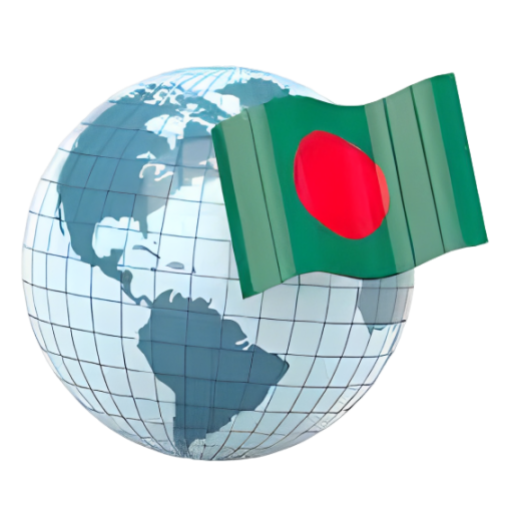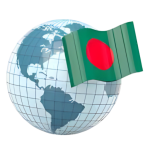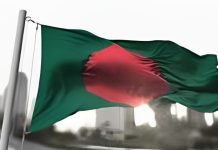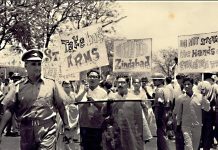We dedicate the fourth issue of Global Bangladesh, Vol. I, to martyrs of our liberation war of 1971. Articles in this issue mostly cover various aspects of the liberation war and the progress made by Bangladesh since 1971.
In his article, Muinul Islam highlights the progress made by Bangladesh involving several metrics such as poverty reduction, self-reliance, economic growth, remittance, micro credit, women empowerment, and digital transformation. Indeed, it is remarkable that Bangladesh in recent years, has outperformed Pakistan in per capita GDP.
Adil Khan, in his article, notes the economic progress made by Bangladesh during the last 50 years. However, the article argues that there are pervasive deficits in governance in Bangladesh, which pose serious threats to sustained progress in core socio-economic indicators. He explores various dimensions and indicators of governance such as corruption, political freedom, human rights, labour rights, rule of law, and civil liberty in Bangladesh.
Khaleda Shehabuddin, the wife of K.M. Shehabuddin, in her article narrates the events of April 1971 that led to the defection of K.M. Shehabuddin (who was the Second Secretary at the Pakistan High Commission in India) from the Pakistan Foreign service and his declaration of allegiance to the emerging nation of Bangladesh. Mr Shehabuddin was a trailblazer for many other Bangladeshi diplomats who chose the path of moral conscience, ignored significant personal risks and challenges, and asserted their loyalty to Bangladesh. Later Mr. Shehabuddin became Bangladesh’s ambassador to several countries.
Jasim Uddin Ahmad, an educationist and a social activist, vividly narrates the turbulent events of the 1969-1971 period. He highlights the contributions of several political activists including Maulana Bhashani, Abdul Mannan Bhuiyan and Shaheed Asad. He also describes how Shibpur in Narshingdi became the epicentre of student and peasant movements. Furthermore, he also describes how Asad’s martyrdom in January 1969 became a catalyst for mass movements against the Ayub regime.
As the war of liberation started on 26 March, 1971, thousands of people including young and adult students volunteered for the liberation of our motherland. At that time, Motiur Rahman was a youth, working at the Savar Dairy Farm . In his article, he describes, in poetic terms, his experience as a freedom fighter in the Savar area of Dhaka.
The election results of 1970, exposed the deep political chasm between East Pakistan and West Pakistan. Political manoeuvrings and negotiations during the January-March period in 1971 substantially increased the political temperature and uncertainty in Pakistan. Sadequl Islam, in his article, provides glimpses of this tumultuous period and the subsequent periods of the liberation war and Victory Day based on his personal observations and experiences in Lahore, Kushtia, and Chapai Nawabganj.
The article by Mustafa Chowdhury provides an outline of his forthcoming book that concentrates on the activities of the Canadian Government, Canadian NGOs, Canadian media, and Canadian people concerning the liberation war of Bangladesh. The Canadian government had to navigate the political water carefully given the fact that in 1970, Canada faced a serious separatist crisis in Quebec and the fact that the United States supported Pakistan. Eventually, the government of Pierre Elliot Trudeau could not be indifferent to the democratic rights of the Bangladeshi people as it recognized Bangladesh in February 1972.
Liberation of Bangladesh should be perceived beyond the establishment of an independent political entity. Anis Chowdhury, in his article, dwells on two important dimensions of liberation: national liberation from the colonial policy of West Pakistan and socio-economic liberation from exploitation and corruption driven by unequal class and power structure. Furthermore, liberation must be perceived as a continuous process. His article illuminates the contributions of progressive political actors and parties toward the liberation of Bangladesh, which unfortunately remain underrated. He mentions various peasant movements such as the uprising of Hajongs and Tebhaga movements of Saontals led by Ila Mitra in North Bengal. He also highlights the roles of progressive leaders of the left movement, especially Moulana Bhashani, in social, language and political movements since the 1950s.
Mohammad Zaman, an expert on international development with decades of experience involving many countries, concentrates on the deconstruction of the concept “home.” He perceives “home” from psychological and philosophical perspectives, beyond physical attributes. He distinguishes between feeling “at home” and “being at home.” For the Bangladeshi diaspora community, the concept of home is quite relevant. Often, a Bangladeshi is asked to write his “permanent home address.” Is it the home in his ancestral village where the home may not physically exist any more?; or, is it in Dhaka? or, Is it somewhere in the Middle East, Canada, UK, or the USA? Furthermore, does the concept of home vary across generations?
The final article reminisces the contributions of two great Bangladeshi physicians in Winnipeg: Dr. Farid Shariff and Dr. Mujibur Rahman. As pioneers among the Bangladeshi diaspora community, they provided all forms of support to many Bangladeshis who moved to Winnipeg as newcomers. Their homes were centres of get-togethers for Bangladeshis in Winnipeg. They were also the role models for the local community.
Thanks for your support and wishing you a happy and prosperous New Year in a turbulent time.
Call for Articles for the First Issue of Vol. II
Global Bangladesh calls for articles for the first issue. Articles on historically significant events, such as the language movement, the 1969 mass upsurge against the Ayub regime, and the declaration of Independence, are particularly encouraged.
The deadline is February 29, 2024.




